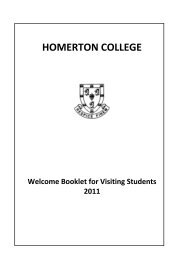The Newsletter of Homerton College, Cambridge & The Homerton Roll
The Newsletter of Homerton College, Cambridge & The Homerton Roll
The Newsletter of Homerton College, Cambridge & The Homerton Roll
Create successful ePaper yourself
Turn your PDF publications into a flip-book with our unique Google optimized e-Paper software.
Sailing Blue<br />
I first started sailing to avoid playing<br />
Rugby. I lack any hand-eye coordination<br />
and the traditional ball<br />
sports that I was being asked to engage<br />
in served little purpose other than<br />
slight humiliation – and I had to run<br />
around a lot, something that my<br />
13-year self had serious issues with.<br />
So I ticked the box marked ‘Sailing’ on my<br />
secondary school form and attended a<br />
course over the summer, hoping that I<br />
would never have to touch a rugby ball<br />
ever again. I loved it, and have never looked<br />
back. Sailing has provided the backdrop<br />
to my life, and I hope it continues to do<br />
so in the future. Through it I have found<br />
immeasurable confidence, thoroughly<br />
enjoyed myself and found many friends. For<br />
those <strong>of</strong> you not au-fait with competitive<br />
sailing, here is a brief overview.<br />
Above Having<br />
just won the<br />
Varsity match<br />
Right On being<br />
presented with<br />
the trophy<br />
(Felix in the<br />
Blues Blazer)<br />
<strong>The</strong>re are three types <strong>of</strong> racing when<br />
it comes to sailing: first, there is Fleet-<br />
Racing where one boat wins, <strong>of</strong>ten out <strong>of</strong><br />
a fleet <strong>of</strong> over 150 vessels. Second, there<br />
is Match-Racing – two boats pitched<br />
directly against each other, as you might<br />
see in the America’s Cup. Lastly, there is<br />
Team-Racing – by far the most complex<br />
<strong>of</strong> the three and participated in mostly by<br />
Universities and Alumni teams across the<br />
world, and something that I have devoted<br />
my sporting life to for nine years.<br />
A team consists <strong>of</strong> three boats, with two<br />
people in each boat. A team-race consists<br />
<strong>of</strong> two teams attempting to out-sail each<br />
other over a short course – a race <strong>of</strong>ten<br />
takes no longer than ten minutes. What<br />
makes it interesting, and tactical, is that<br />
beating that other team, not winning, is<br />
what counts. Your boat’s finishing position<br />
is the number <strong>of</strong> points your boat gets. (So<br />
1st gets one point and so on) <strong>The</strong>re are six<br />
boats in the race, so there are 21 points on<br />
<strong>of</strong>fer. <strong>The</strong> aim is to get fewer points than<br />
the opposing team. This can be achieved<br />
through ten different combinations –<br />
and not all <strong>of</strong> them include coming first!<br />
Slowing down your opponents, letting<br />
your team-mates’ boats through and giving<br />
penalties to the rival team is the name <strong>of</strong><br />
the game – actually finishing a race can<br />
sometimes leave you at a disadvantage!<br />
I came to <strong>Cambridge</strong> in October 2008<br />
and found a place on a strong University<br />
2nd team – we came 11th at the National<br />
Championships in April 2009. I spent every<br />
Wednesday afternoon, and every weekend,<br />
either training at Grafham (about 45<br />
minutes drive away from <strong>Cambridge</strong>) or at<br />
events around the country, from Aberdeen<br />
to Southampton. I certainly learnt to be very<br />
organised with work (and how to sail on a<br />
Sunday with a horrific hangover…). I gained<br />
a half-blue on being selected for the Varsity<br />
match – which we then sadly lost.<br />
In my second year, I ran successfully for<br />
Captain, and was responsible for the<br />
organisation <strong>of</strong> three teams with regards to<br />
squad selection and training. We must have<br />
done something right: sailing with the 1sts,<br />
I came 5th at the National Championships<br />
and earned my Full Blue (Full Blue status is<br />
only awarded if a top-8 ranking is achieved).<br />
Captaining the Varsity Match was a very<br />
special experience, and winning was a<br />
moment I will always remember fondly –<br />
despite being summarily thrown into the<br />
sea on our victory by the rest <strong>of</strong> the team.<br />
Outside <strong>of</strong> <strong>Cambridge</strong>, I sail both an RS<br />
200 and a Swallow (two and three-man<br />
dinghies), the latter <strong>of</strong> which I took to Cowes<br />
Week in 2010, coming a creditable 4th, and<br />
being the first Swallow to ever finish a race<br />
on the Royal Yacht Squadron Line.<br />
This year, I have taken a back-seat, becoming<br />
Commodore <strong>of</strong> the CU Cruising Club,<br />
and focused a little more on my degree<br />
(spending only four days a week on it was<br />
starting to show), choosing only to organise<br />
<strong>Cambridge</strong>’s annual sailing event, the Cam<br />
Cup. I have taken on a few coaching roles<br />
with a local school up near Rutland Water<br />
to keep interested in the sport, and will<br />
hopefully return to it next year!<br />
Felix Danczak<br />
Politics Psychology & Sociology 2008–2011<br />
12<br />
<strong>Homerton</strong>ian
















